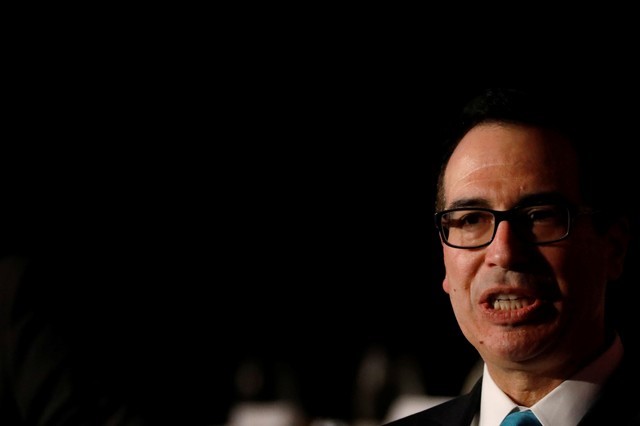 © Reuters. U.S. Treasury Secretary Steven Mnuchin speaks during a moderated discussion before the Economic Club of New York, in New York
© Reuters. U.S. Treasury Secretary Steven Mnuchin speaks during a moderated discussion before the Economic Club of New York, in New YorkBy Noah Barkin and Yara Bayoumy
DAVOS, Switzerland (Reuters) – A day after sending the dollar reeling with comments supportive of a weak U.S. currency, U.S Treasury Secretary Steven Mnuchin said the Trump administration was not seeking trade wars but would defend its economic interests.
At a news conference at the World Economic Forum in Davos, Mnuchin played down his comments on Wednesday that a weaker dollar was “good for us as it relates to trade and opportunities”, saying they had been “balanced and consistent”.
The remarks were seen by markets as a departure from traditional U.S. currency policy and a sign that U.S. President Donald Trump is stepping up his attack on China and other big trading partners as part of his “America First” agenda.
“I thought my comment on the dollar was actually quite clear yesterday,” Mnuchin told reporters. “I thought it was actually balanced and consistent with what I’ve said before, which is, we are not concerned with where the dollar is in the short term.”
Mnuchin said there were “both advantages and disadvantages of where the dollar is in the short-term” and stressed that the United States wanted fair economic competition.
“We want free and fair and reciprocal trade. So I think it’s very clear. We’re not looking to get into trade wars. On the other hand we are looking to defend America’s interests.”
After Mnuchin’s remarks on Wednesday, Commerce Secretary Wilbur Ross denied that his colleague was advocating a weaker dollar, but when asked about the risk of trade wars, he told CNBC: “Trade war has been in place for quite a little while, the difference is the U.S. troops are now coming to the ramparts.”
Speaking at the Thursday morning news conference, Ross said: “People are using some predatory practices against us and we’re not flinching from that.”
TRUMP SPEECH
The comments came a day after European leaders, without specifically mentioning the United States, warned against a rise in nationalism and protectionism.
Chinese Foreign Ministry spokeswoman Hua Chunying told a regular news briefing in Beijing on Thursday that the country’s leaders were committed to openness.
“I believe everyone has already noticed that at the end of last year China has taken real steps to greatly loosen its financial industry, market access and others,” she said.
Trump, who landed in Zurich on Thursday morning on his way to Davos, is expected to promote his “America First” policies in a speech at the forum on Friday.
Mnuchin said he had met the economic adviser to Chinese President Xi Jinping and had a “very good and open dialogue”, talking about North Korea sanctions and trade.
“We’re working together on the issue of the trade deficit in a mutual desire to shrink the trade deficit. We talked about some very specific ideas that we both have on that.”
Asked about negotiations between the United States, Canada and Mexico to rework the North American Free Trade Agreement (NAFTA), Ross said it was more important to get a “proper deal” than a quick agreement.
But he conceded that a Mexican presidential election, Canadian provincial elections and the U.S. congressional election — all this year — could complicate the talks if they drag on.
“As we move further into the year, the political calendar gets more complicated,” Ross said.
Source: Investing.com





























